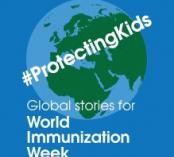
Vaccines against debilitating and deadly diseases save the lives of over 2.5 million children every year. They are an arguably smart global investment with an economic return of 18-30%. Vaccine campaigns, especially in the developing world, have greatly reduced the incidence of diseases such as whooping cough, diphtheria and Hib meningitis. By further scaling up childhood vaccinations in 72 of the poorest countries, we can save an estimated 6.4 million between 2011 and 2020. Continued support from donors, including the United States, has ensured progress in finding vaccines for HIV/AIDS, malaria and a number of neglected tropical diseases.
Today the most notable vaccine campaign is the push to eradicate polio, and we are within reach of achieving this goal, with 99% of the world polio free. Polio remains endemic in just three countries: Nigeria, Afghanistan and Pakistan. However, polio outbreaks continue as cases are imported from endemic countries to other countries, and fragile states like Syria and Ukraine face immunization levels that fall below 50%.
An increasingly alarming roadblock to eradicating polio is the rise in attacks on health care workers employed as vaccinators. In 2013-2014, 89 polio workers and their police escorts were killed in Pakistan and Nigeria. What’s most striking about this figure is that it exceeds the estimated number of actual deaths from polio; the Global Polio Eradication Initiative (GPEI) estimated that between 15 and 30 people died from the disease in 2014.
Much needed attention was paid to the question of health worker safety during the Ebola crisis in 2014 and into 2015. Health workers ensure the frontline prevention and response to infectious disease; it seems logical, albeit tragic, that their lives would be at risk because of their proximity to infected patients. However there is no reason that health workers participating in vaccination campaigns should have to risk their lives to carry out their task – a task that ultimately saves lives. The reasons given for these attacks tie into local fears and suspicions that often are connected to a larger geopolitical calculus; the admission by the United States that it had used a vaccination campaign as a cover to gather information about the whereabouts of Osama Bin Laden reinforced these fears, even if the admission was accompanied by a pledge never to use this approach again.
The full article continues at http://globalhealth.org/eradicating-polio-requires-protecting-vaccinators on Global Health Council’s website.

